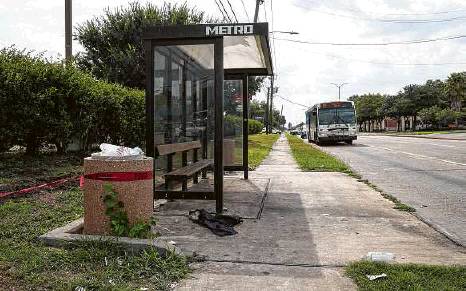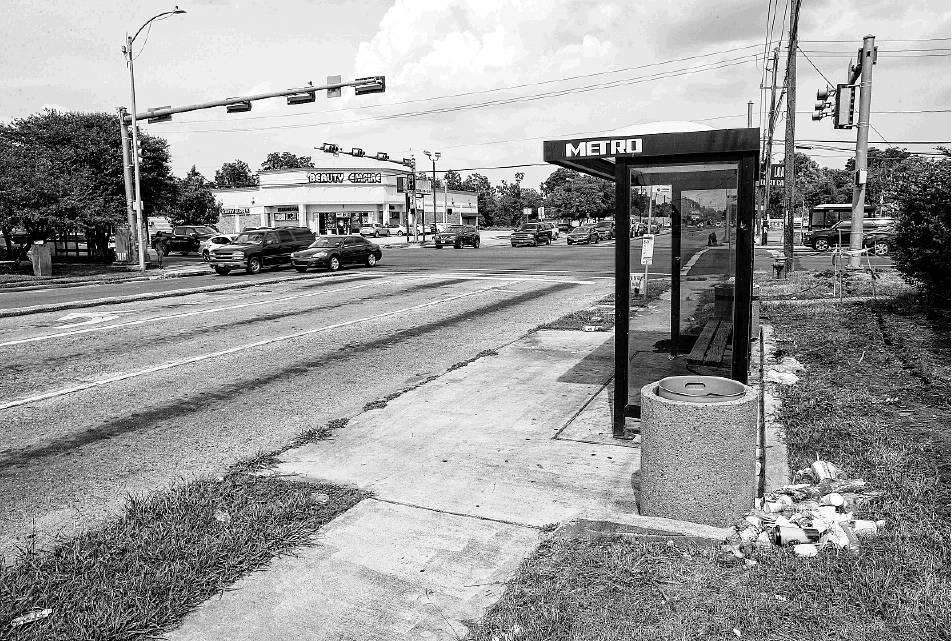Metro gears up for cleaner bus stops
Plan seeks to triple maintenance funds; board approval likely
By Dug Begley STAFF WRITER
Metro is banking on cleaner bus stops and stations helping to clean up its image with some Houston-area residents — some of whom they hope to lure as riders at a cost.
Under a plan proposed by Metropolitan Transit Authority staff, transit officials would more than triple their annual spending on bus stop and station cleaning. If board members approve the proposal on Thursday, Metro’s maintenance and cleaning costs would jump to $21 million a year, from around $6.5 million.
Approval is likely, given officials’ supportive responses to a presentation this week.
“This is much better for the customer,” said board member Sanjay Ramabhadran.
This would be the first time for Metro to enforce a policy of cleaning every stop. CEO Tom Lambert said the absence of this standard was an oversight.
“I’ll be honest with you, we probably should have been, but we weren’t,” Lambert said of not already having systemwide cleaning.
The increase in maintenance spending comes as Metro addresses various other service improvements throughout the region. In the past year, transit officials have increased spending for Metro Police, approved hiring part-time officers to fill staffing gaps, committed to major sidewalk and bus stop repairs and added frequency to many routes.
As a result, Metro’s proposed operating budget for the fiscal year that starts Oct. 1 is expected to jump from $626.2 million to $681.2 million. Sales tax revenue, which funds roughly 90 percent of operations costs, has grown steadily in recent years, leaving the agency with $173.2 million in reserves.
Metro maintains 8,646 of its 8,952 bus stops; the other 306 are cleaned and monitored by local management districts, such as in downtown Houston and Uptown. Even those agreements, however, vary in terms of Metro’s involvement. The Houston Downtown Management District’s staff picks up the trash in that area, for example, but Metro power-washes the stations.
Under the current regimen, contractors power-wash key stops monthly and provide cleaning and trash removal five times a week for about one-third of the agency’s stops. Different vendors were awarded contracts for various parts of the service area. Costs fluctuate based on the number of bus stops and the level of service needed.
Also in flux are the quality and cleanliness of the stops. The least attractive tend to be those that fall below the ridership threshold that Metro has used to determine whether frequent attention is justified.
“Some of them are just filthy. … It makes the community look bad,” Riverside Terrace resident Monique Jackson said.
Jackson does not ride the bus, though her son uses it to get to college classes. She said Metro and the city of Houston, which cleans the sidewalks, should ensure stops are clean for the benefit of residents as well as riders.
Greg Gaines, who rides Metro from Acres Homes in northwest Houston to his job in Montrose, said cleanliness doesn’t affect whether he rides the bus. But cleaner stops would make it abetter experience, he said.
“If I go into a restaurant and it’s dirty, then I think the kitchen is dirty,” Gaines said.
Along with safety along the bus and rail lines, the cleanliness of stops and stations is among the most frequent complaints to Metro officials.
“They’re related,” Lambert said, noting that the cleanliness of a stop indicates how often it is monitored and used. The cleanings also take care of graffiti, which gives the impression of criminal activity.
Under the new plan, Metro’s 1,285-square-mile service area, representing the vast majority of Harris County, remains broken into five zones, but the per-zone spending jumps from $1.3 milllion to $4.2 million. A contractor would maintain bus stops in each zone, including cleaning, removing trash, abating graffiti and attending to landscaping needs such as mowing.
“They are going to be obligated to provide photo documentation,” said Roberto Treviño, executive vice president of planning, engineering and construction for Metro.
The revised contracts also call for rapid response to problems reported to Metro, a critical factor in keeping the stops attractive, officials said.
“You can clean them one minute and the next there is something else,” board member Don Elder said.
Officials said they hope to avoid causing other problems as they work to make the stops cleaner.
“Let’s have something in the contract that you are not going to shut down a lane of traffic to clean a bus stop,” Ramabhadran said. dug.begley@chron.com

